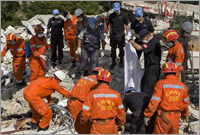Haiti, 2010

Haiti, 2010
 On 12 January 2010, a devastating earthquake, measuring 7.0 on the Richter scale, hit Haiti killing more than 200,000 people and displacing more than two million others. Among those who perished were 102 United Nations personnel, including two human rights officers, constituting the highest loss of life from a single event in United Nations history. The earthquake leveled the capital city, delivering a severe blow to an already vulnerable Haitian economy and infrastructure, and severely impeding nation-building efforts in the country.
On 12 January 2010, a devastating earthquake, measuring 7.0 on the Richter scale, hit Haiti killing more than 200,000 people and displacing more than two million others. Among those who perished were 102 United Nations personnel, including two human rights officers, constituting the highest loss of life from a single event in United Nations history. The earthquake leveled the capital city, delivering a severe blow to an already vulnerable Haitian economy and infrastructure, and severely impeding nation-building efforts in the country.
The United Nations in Haiti:
MINUSTAH was originally set up by the Security Council in April 2004 to support the Transitional Government in ensuring a secure and stable environment; to assist in monitoring, restructuring and reforming the Haitian National Police; to help with comprehensive and sustainable Disarmament, Demobilization and Reintegration (DDR) programmes; to assist with the restoration and maintenance of the rule of law, public safety and public order in Haiti; to protect United Nations personnel, facilities, installations and equipment and to protect civilians under imminent threat of physical violence; to support the constitutional and political processes; to assist in organizing, monitoring, and carrying out free and fair municipal, parliamentary and presidential elections; to support the Transitional Government as well as Haitian human rights institutions and groups in their efforts to promote and protect human rights; and to monitor and report on the human rights situation in the country.
In the following years, the mandate of MINUSTAH, its concept of operations and the authorized strength were adjusted by the Security Council on several occasions to adapt to the changing circumstances on the ground and to the evolving requirements as dictated by the political, security and socio-economic situation prevailing in the country.
Following the devastating earthquake which hit Haiti on 12 January 2010, the Council, increased the overall force levels of MINUSTAH to support the immediate recovery, reconstruction and stability efforts.
The MINUSTAH Human Rights Section/OHCHR field presence in Haiti has been deployed to eight of Haiti’s ten Departments since early 2005 and engages in monitoring, public reporting and capacity-development initiatives with national and local authorities, including the national human rights institution, as well as with civil society organizations, as well as mainstreaming of human rights-based approaches with UN partners.
Lisa Mbele-Mbong, 1971-2010
Lisa Mbele-Mbong, a national of the United States originally from Cameroon, joined the UN in 2002 as a human rights officer in the Democratic Republic of the Congo. Her passion for human rights brought her to Haiti in 2005 where she spent three years as the team leader for the Policy and Planning Unit at the United Nations Stabilization Mission in Haiti (MINUSTAH).
Lisa was a typical “UN child.” Her father worked for the World Meteorological Organization and her mother for the World Health Organization. She grew up in Cameroon, lived in Burundi and later moved to Europe for high school. She then went on to study in the United States at Smith College in Massachusetts.
After graduation, Lisa began her career in Washington D.C. with the National Democratic Institute when she made her first trip to Haiti organizing elections.
Andrea Loi Valenzuela, 1965-2010
Andrea Loi Valenzuela, a national of Chile, was a Human Rights Officer with MINUSTAH.
She first traveled to the country in 1993 to work for the International Civilian Mission in Haiti (MICIVIH), a joint project of the UN and the Organization of American States.
Andrea joined MINUSTAH in 2005 where she was responsible for investigating human rights violations in several impoverished areas in Haiti, including Port-de-Paix, Hinche and Ft. Liberté.
A lawyer by training, Andrea graduated in 1987 from the Gabriela Mistral University in Chile.